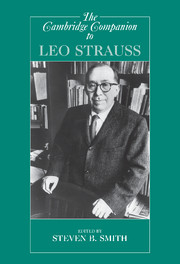Book contents
- Frontmatter
- 1 Introduction: Leo Strauss Today
- 2 Leo Strauss: The Outlines of a Life
- 3 Leo Strauss and the “Theologico-Political Predicament”
- 4 Strauss’s Recovery of Esotericism
- 5 Strauss’s Return to Premodern Thought
- 6 Leo Strauss and the Problem of the Modern
- 7 The Medieval Arabic Enlightenment
- 8 “To Spare the Vanquished and Crush the Arrogant”: Leo Strauss’s Lecture on “German Nihilism”
- 9 Leo Strauss’s Qualified Embrace of Liberal Democracy
- 10 Strauss and Social Science
- 11 The Complementarity of Political Philosophy and Liberal Education in the Thought of Leo Strauss
- 12 Straussians
- Bibliography
- Index
- Series List
7 - The Medieval Arabic Enlightenment
Published online by Cambridge University Press: 28 November 2009
- Frontmatter
- 1 Introduction: Leo Strauss Today
- 2 Leo Strauss: The Outlines of a Life
- 3 Leo Strauss and the “Theologico-Political Predicament”
- 4 Strauss’s Recovery of Esotericism
- 5 Strauss’s Return to Premodern Thought
- 6 Leo Strauss and the Problem of the Modern
- 7 The Medieval Arabic Enlightenment
- 8 “To Spare the Vanquished and Crush the Arrogant”: Leo Strauss’s Lecture on “German Nihilism”
- 9 Leo Strauss’s Qualified Embrace of Liberal Democracy
- 10 Strauss and Social Science
- 11 The Complementarity of Political Philosophy and Liberal Education in the Thought of Leo Strauss
- 12 Straussians
- Bibliography
- Index
- Series List
Summary
[In memorian Muhsin S. Mahdi] Leo Strauss's turn to the Platonic political tradition transformed our understanding of the Islamic falasifa and their disciple Maimonides. The decisive moment was the appearance of Philosophie und Gesetz in 1935, when Strauss was thirty-six, at the midpoint of his life. I wish to focus on this decisive moment. I believe Strauss's fundamental approach to the falasifa and Maimonides was already apparent in Philosophy and Law. Like the medieval commentators on The Guide of the Perplexed, whom he read, Strauss was alert to Maimonides's heterodoxy and style of exoteric writing. There are many superb studies of Strauss's thought. Some I shall cite, but I prefer to encounter Strauss's writings directly. The problem is that each work is connected to the others and they are difficult to take in, let alone comprehend, like an intricate hall of mirrors, where we can never be sure of what we see. For instance, in Philosophy and Law he referred to Nietzsche's Beyond Good and Evil in an enigmatic note to the Introduction, and cited or alluded to Nietzsche elsewhere, the references to Nietzsche being all crucial for understanding Strauss's view of the falasifa and Maimonides.
- Type
- Chapter
- Information
- The Cambridge Companion to Leo Strauss , pp. 137 - 170Publisher: Cambridge University PressPrint publication year: 2009
- 5
- Cited by

